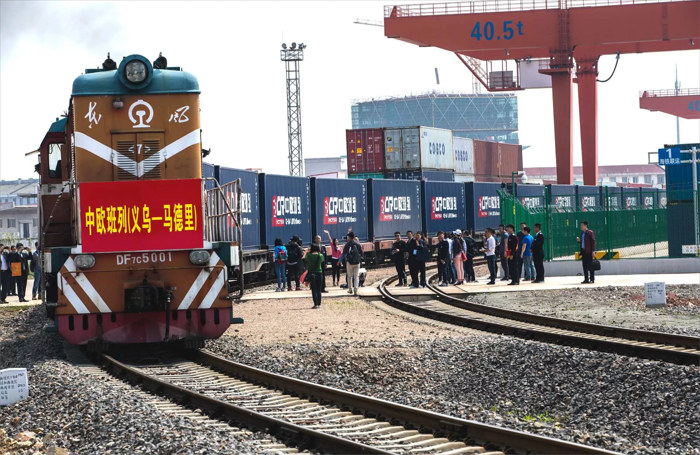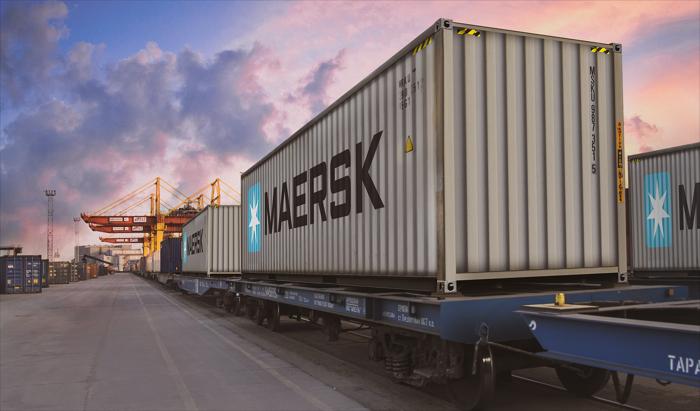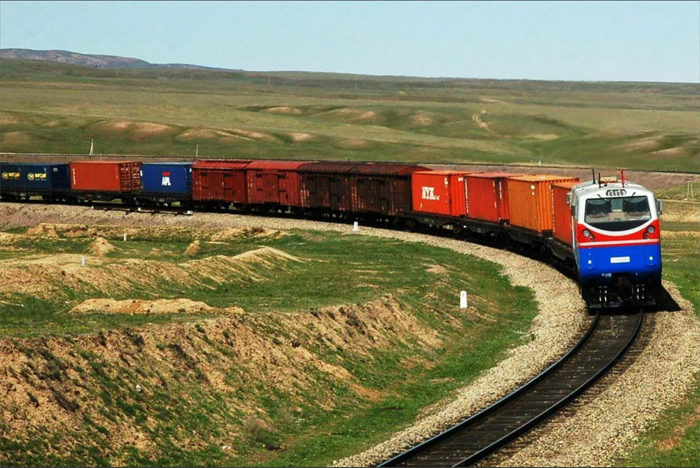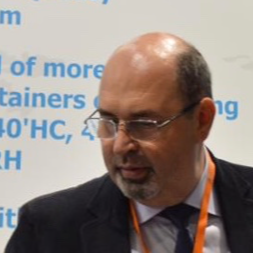Two new intermodal China-Kyrgyzstan-Uzbekistan (CKU) services were launched on 4th July. One originates from Langfang city, near Beijing, while the other is from Guangzhou city. These two services have the potential to connect Central Asia with two Chinese economic zones: the Beijing area and the Guangdong-Hongkong-Macau Greater Bay Area.
Both routes will cross Kyrgyzstan and ultimately reach Tashkent in Uzbekistan, but they utilise different modal combinations. For the route departing from Beijing, the train will first arrive at the Kashgar area in Xinjiang. From there, the cargo will be reloaded onto trucks and enter Kyrgyzstan via the Irkeshtam border crossing. Once the trucks reach Osh in Kyrgyzstan, they will be reloaded onto trains again and shipped to the final destination, Tashkent. This route is estimated to deliver the goods in 12 days, covering a distance of 6,000 kilometres.
The route departing from Guangzhou has only one modal switch. The train will carry the goods to the same Xinjiang border crossing, Irkeshtam, and from there, the cargo will continue the rest of the journey via trucks only. This route will take around 16 days. These two new routes serve as alternatives to the highly anticipated CKU railway, and this alternative option was already in place last year.
CKU corridor on the move
As early as July of last year, the CKU rail-road intermodal route was already tested. In November, a new CKU rail-road service was launched from Xinjiang, China to Namangan, Uzbekistan. Part of the CKU intermodal service in November operated on a fixed timetable, ensuring that goods were delivered according to a planned schedule. However, this fixed timetable was only applicable to the rail service section, specifically for the portion before the cargo enters Kyrgyzstan from China. Nevertheless, the corridor is now on the move, with the volume of goods growing as more services are developed.

Customs clearance company in the free zone at Dubai Airport and Jebel Ali Port
+971521893739
For any question, please do not hesitate to ask me
Customs clearance company in the free zone at Dubai Airport and Jebel Ali Port
+971521893739
How 5 entrepreneurs will use Amazon Business' first-ever Small Business Grants to make a difference in their communities
Amazon Business awarded more than $250,000 in funds and prizes to growing small businesses during its inaugural Small Business Month.
Amazon's store for smart business buying, Amazon Business, is committed to the growth of small businesses. In 2022 Amazon Business launched its Small Business Grants to celebrate small businesses and entrepreneurs making an impact in communities across the U.S.
The winners received grants of up to $25,000 each and additional prizes, like an annual Business Prime membership, Ring security kits, and Amazon Web Services credits and training benefits. Amazon Business customers with an annual revenue of $1 million or less were eligible. The grand prize winner and four finalists were selected by fellow Amazon Business customers from more than 19,000 applicants.
The grant winners are inspiring innovation and driving meaningful impact in their communities. They are promoting sustainable business models and providing access to education in STEM fields (science, technology, engineering, and math), along with music and sports. Meet the winning small business owners below, and learn how they're making a difference.
Grand Prize Recipient
Nicole Greggs, president and owner of MusicMakers! Summer Camp
Based in Coral Springs, Florida, MusicMakers! Summer Camp seeks to develop musicianship, character, and respect for others within a safe and secure environment. Nicole Greggs, president and owner of MusicMakers!, founded the organization 25 years ago with the goal to ignite a lifelong interest in music-making and an informed appreciation of the value and impact of music education.
With aging musical instruments and increased enrollment in their programs, Greggs and the MusicMakers! team are using their $25,000 grant to buy new instruments and improve their website, social media, and administration—all of which will help the staff of seven continue to deliver high-quality music education to their students.
"I never dreamed my company could be recognized for an award this large,” Greggs said. “I am thrilled that going forward we will be able to help even more people with better instruments and services, and that our company's mission has been validated. This award means the world to us."
Finalist: Nikisha Alcindor, founder of STEM Educational Institute
The STEM Educational Institute, founded by Nikisha Alcindor, provides programming that gives underrepresented high school students throughout New York City the technological skills they need to enter today's workforce. The institute will use its $20,000 grant to build out its learning module system and increase access to coding, financial literacy, and mental health services—along with supporting additional student scholarships.
“Every day, thousands of under-resourced students receive inadequate STEM education, financial literacy, and mental health resources,” said Alcindor. “As a finalist of the Amazon Business Small Business Grant, the STEM Educational Institute will be able to provide valuable resources for youth to have a brighter future and become the future pipeline of diverse business leaders.”
Finalist: Nomie Hamid, chef and owner of Virtual X Kitchen
Virtual X Kitchen is a sustainable virtual kitchen located in College Park, Maryland. Virtual X Kitchen's chef and owner, Nomie Hamid, founded his business to create an accessible way for people to open a restaurant without the costs of maintaining their own storefront. By maximizing kitchen space and hosting multiple restaurants, the business model reduces waste, saves space, and gives customers multiple restaurant offerings from one location with a seamless ordering experience.
Virtual X Kitchen will use its $20,000 grant to bring its sustainable model to more people in the community through a more robust operations and marketing budget.
“We are so grateful for the opportunity that this grant has provided our business,” Hamid said. “Thank you to everyone that voted! It has been amazing to see how far Virtual X Kitchen has come since our launch a little over a year ago, and we can't wait to see how far it will go.”
Finalist: Max Steitz and Franziska Trautmann, founders of Glass Half Full
Founded by Max Steitz and Franziska Trautmann, New Orleans-based Glass Half Full transforms recycled glass into sand and glass cullet, which is used in coastal restoration projects, disaster relief efforts, new glass products etc. The small business also promotes environmental equality and creates green jobs for the local economy.
The company has recycled more than 2.5 million pounds of glass from more than 10,000 recyclers across the state so far. The company will use its $20,000 Small Business Grant to purchase the necessary machinery and equipment to keep its primarily volunteer-run business up and running.
“On behalf of the entire Glass Half Full team and community, we're beyond grateful to have received this small business grant,” Steitz said. “This opportunity will enable us to expand our mission and impact, and recycle more glass than ever. Thank you to everyone who voted for Glass Half Full—we're so thankful for your support.”
Finalist: Addison Staples, founder of Aces in Motion
Based in Gainesville, Florida, the nonprofit Aces in Motion is a sports-based, after-school youth development program led by Addison Staples. Its mission is to support the local community's under-resourced youth by providing academic assistance and life skills through tennis.
With the $20,000 Small Business Grant, Aces In Motion will supply students and volunteer staff with everyday necessities to promote healthy eating habits and provide hygiene products for students without access to the items they need.
“We at Aces in Motion are so grateful to be a recipient of Amazon Business' Small Business Grant,” said Staples. “These funds mean so much to our organization and the families we partner with. Our goal is to provide resources and support to our students and their needs, including purchasing healthy snacks and personal hygiene products to those families living in poverty, helping close the economic gap within our community. Thank you!”

Maersk is attempting to undo weeks of heavy discounting on the Asia-North Europe tradelane with a substantial increase in its FAK rates at the end of the month.
And it warned that other routes “may also be subject to increases” as it reassess rate structures across its network.
The rate announcement this morning will see Maersk’s FAK rates from Asian main ports to the three North European hubs of Rotterdam, Felixstowe and Gdansk increase on 31 July to $1,025 per 20ft and $1,900 per 40ft.
The carrier said it was needed in order “to continue offering you a broad portfolio of high-quality services”, adding that the rates would be valid until further notice, “but not beyond” 31 December.
The rate erosion on the trade has been accelerating, Xeneta’s XSI Asia-North Europe component average spot rate losing another 1.3% last week, to $1,224 per 40ft, having virtually halved since the beginning of the year.
And market rates for North Europe, including those offered via Maersk’s in-house platform, Twill, have been falling dramatically in the past few weeks to below $1,000 per 40ft, as early peak season demand has proved to be a damp squib. Indeed, hitherto Twill has been quite aggressive in the market, a number of forwarding and shipper contacts confirming they had agreed low rate deals with Maersk’s logistics arm.

The duality of the market
Ocean freight
Trans-Pacific spot rates are reaching a critical level, indicating a significant increase in shipping costs. As the second half of 2023 approaches, there is a possibility of a price war emerging among ocean carriers as they compete to increase their market share in the current economic downturn. However, carriers are observing stable rate levels on most Indian trades, indicating consistent pricing. The Indian market continues showing resilience despite global supply chain challenges and disruptions. Nevertheless, West India-Genoa cargo contract rates for a 20-foot box have moved up to $725, from $700 at the end of May, while for an FEU, rates have dropped to $700, from $800/FEU a month ago.
Overall, the profitability of carriers is severely impacted by the downward spiral of freight rates. Some experts think that companies may need to consider consolidation, capacity adjustments, or other measures to navigate difficult market conditions. For now, carriers have been resorting to aggressive pricing strategies and discounts to attract cargo and maintain market share but this approach is not sustainable in the long-run. Consequently, the charter market is experiencing a decline as carriers opt to off-hire or return ships instead of renewing charter contracts.
The pressure to lower rates is further intensified by the excessive number of new vessels entering the market. Recently an additional 624,000 container newbuild slots have been booked as shipowners and operators are strategically planning for future capacity requirements. It is also reported that MSC is soon to further increase its owned container capacity.
All these new bookings are expected to support the efficient movement of goods and contribute to overall industry resilience. In fact, data shows that schedule reliability has reached its highest level in several years. However, it is attributed to factors such as improved vessel performance and better operational practices rather than the expanded capacity. Digitalization and advanced technologies also play a significant role in achieving higher schedule reliability by enabling better data sharing and real-time tracking. Consequently, shipping lines are reducing the number of blank sailings as they strive to meet growing customer demands and optimize vessel utilization.
Ports
- The Canadian strike that started on July 1 is luckily to affect multiple ports across the country, including Vancouver, Montreal, and Halifax. The strike involves approximately 6,000 workers who are members of the International Longshore and Warehouse Union (ILWU) Canada. Efforts to resolve the labor dispute and avoid the strike are ongoing, but a resolution has not yet been reached.
- A new bill has been introduced to limit the power of unions in response to the recent strikes on the US West Coast. The bill proposes changes to existing labor laws to provide more flexibility in hiring and to discourage strikes. Supporters of the bill argue that excessive union power has contributed to prolonged and costly disruptions. Proponents believe that curbing union influence will enhance the competitiveness and reliability of US ports. However, critics argue that the bill undermines workers' rights and could lead to unfair labor practices.
Rail
- Union Pacific, Norfolk Southern, and CSX are joining forces to establish a new intermodal freight corridor in the US. It will link Mexico, Texas and the US south east as near-shoring drives capacity demand. The project is expected to bring numerous benefits, including reduced congestion, lower emissions, and increased capacity for freight movement.
- From July 1, CMA CGM reviewed peak season surcharges for shipments from the Indian Subcontinent to the US East Coast. The updated surcharge is $150 per 20' dry container and $300 per 40' and 45' dry box.
- Train traffic on the China-Kazakhstan border has seen a significant increase of 14.6% during this year proving the importance of the Belt and Road initiative. The trend of increasing train traffic is likely to continue as both countries seek to strengthen their economic ties and expand trade opportunities.
- Kazakhstan, Azerbaijan, and Georgia have agreed to establish a joint logistics company for transportation on the Trans-Caspian International Transport Route (TITR). It is a part of the New Silk Road initiative. The joint logistics company will focus on streamlining freight transportation processes, including customs procedures, documentation, and infrastructure development.
- Germany is facing the possibility of rail strikes in the autumn, following the disputes between Deutsche Bahn and the trade union GDL. The exact timing and duration of the strikes have not been confirmed. The GDL has expressed its dissatisfaction with the progress of negotiations.
Rotes, rates & services
- CMA CGM has expanded its multimodal capabilities by integrating Containerships that specializes in short-sea shipping and logistics in Europe and the Mediterranean region. The move aligns with CMA CGM's strategy to strengthen its presence in the intra-European market and diversify its offerings.
- CMA CGM has modified its BSMAR (Black Sea Medline) service route. The new rotation is: Constanta – Ambarli – Aliaga – Malta – Valencia – Algeciras – Casablanca – Tanger Med – Malta – Piraeus – Gebze – Constanta
- CMA CGM has rescheduled its Turkey Med Express 1.2 service (TMX1.2) with the new rotation: Izmit – Gebze – Gemlik – Aliaga – Valencia – Barcelona – Marseille – Djen Djen – Annaba – Izmit.
- CMA CGM has revealed plans to overhaul its Euronaf service, which serves West Mediterranean, the Tanger hub, and Algerian ports. The company aims to achieve this by consolidating four loops into two, resulting in a more efficient and streamlined service.
These are only several changes that occurred in more than 250 bn freight rates across 25 million routes with more than 1 million market players. Want to share some news about your company, services, and routes? Just post them on MAXMODAL, a multimodal network that digitally connects routes and rates worldwide to automate sales and operations across container transportation & logistics industry. Join to innovate.


Berry, where is your face or logo?
New Silk Road trains crossing the China-Kazakhstan border have increased by 14.6 per cent till May this year, with an overall volume of 5.903 trains. Alashankou terminal contributed to the volume with 2.714 trains whereas traffic via Khorgos terminal amounted to 3.189 with a year-on-year growth of 10.4 per cent and 18.4 per cent, respectively. This was revealed by China Railway, the national railway company of China.
When talking about New Silk Road trains, the China-Kazakhstan border in Xinjiang plays a significant role as the majority of the volume transported between Europe and China is reloaded here. Khorgos terminal ranked first as the busiest cross-border terminalin the country. It processed over 7.000 China Europe Express trains in 2022.
Alashankou, which used to be the busiest border crossing, is currently undergoing renovation for capacity expansion and therefore handled less trains. Currently, the Alashankou terminal has the capacity of handling 17 trains per day, 21 at its best scenario, with an estimated capacity of digesting 200.000 TEU per year. This resulted in cargo being redirected to the Khorgos border crossing this year, specifically cargo between China and Central Asian countries (except for Kazakhstan).









